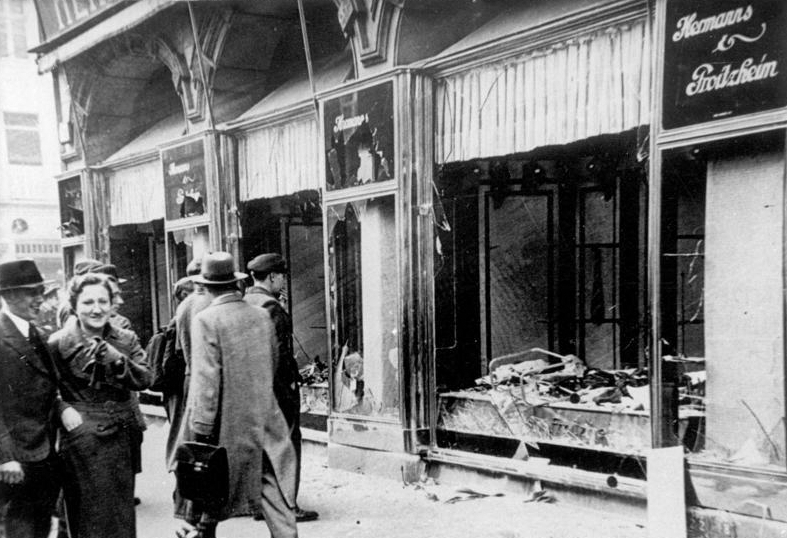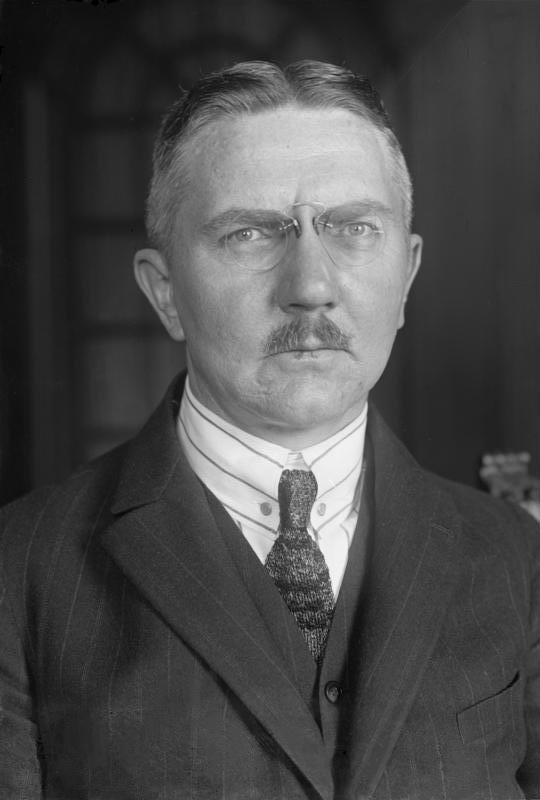|
Rudolf Brinkmann (Secretary Of State)
Rudolf Brinkmann (28 August 1893 – 1 August 1955) was a German economist and banker who rose to become a State Secretary in the Reich and Prussian Ministry of Economics and the Vice President of the '' Reichsbank'' in Nazi Germany. After only about a year in office, he had a nervous breakdown, was hospitalized for a severe psychiatric condition and relieved of his posts. Early life Brinkmann was born in Greene, a district in the city of Einbeck. After obtaining his ''Abitur'', he studied political science and economics at the University of Bonn and the Humboldt University of Berlin. At the outbreak of the First World War in August 1914, he joined the Imperial German Army and served as a front line soldier in the 46th (Lower Saxony) Field Artillery Regiment. In March 1916, he was discharged from the army with the rank of '' Gefreiter'' because of an injury which rendered him unfit for further military service. He began a career in banking, and worked from 1919 in Göttin ... [...More Info...] [...Related Items...] OR: [Wikipedia] [Google] [Baidu] |
Nazi Germany
Nazi Germany (lit. "National Socialist State"), ' (lit. "Nazi State") for short; also ' (lit. "National Socialist Germany") (officially known as the German Reich from 1933 until 1943, and the Greater German Reich from 1943 to 1945) was the German state between 1933 and 1945, when Adolf Hitler and the Nazi Party controlled the country, transforming it into a dictatorship. Under Hitler's rule, Germany quickly became a totalitarian state where nearly all aspects of life were controlled by the government. The Third Reich, meaning "Third Realm" or "Third Empire", alluded to the Nazi claim that Nazi Germany was the successor to the earlier Holy Roman Empire (800–1806) and German Empire (1871–1918). The Third Reich, which Hitler and the Nazis referred to as the Thousand-Year Reich, ended in May 1945 after just 12 years when the Allies defeated Germany, ending World War II in Europe. On 30 January 1933, Hitler was appointed chancellor of Germany, the head of gove ... [...More Info...] [...Related Items...] OR: [Wikipedia] [Google] [Baidu] |
Walther Funk
Walther Funk (18 August 1890 – 31 May 1960) was a German economist and Nazi official who served as Reich Minister for Economic Affairs (1938–1945) and president of Reichsbank (1939–1945). During his incumbency, he oversaw the mobilization of German economy for rearmament and arrangement of forced labor in concentration camps. After the war he was tried and convicted as a major war criminal by the International Military Tribunal at Nuremberg. Sentenced to life in prison, he remained incarcerated until he was released on health grounds in 1957. He died three years later. Early life Funk was born into a merchant family in 1890 in Danzkehmen (present-day Sosnowka in the Russian Kaliningrad Oblast) near Trakehnen in East Prussia. He was the only one of the Nuremberg defendants who was born in the former eastern territories of Germany. He was the son of Wiesenbaumeister Walther Funk the elder and his wife Sophie (née Urbschat). He studied law, economics, and philosophy ... [...More Info...] [...Related Items...] OR: [Wikipedia] [Google] [Baidu] |
Hjalmar Schacht
Hjalmar Schacht (born Horace Greeley Hjalmar Schacht; 22 January 1877 – 3 June 1970, ) was a German economist, banker, centre-right politician, and co-founder in 1918 of the German Democratic Party. He served as the Currency Commissioner and President of the Reichsbank under the Weimar Republic. He was a fierce critic of his country's post-World War I reparations obligations. He served in Adolf Hitler's government as President of the Central Bank (''Reichsbank'') 1933–1939 and as Minister of Economics (August 1934 – November 1937). While Schacht was for a time feted for his role in the German "economic miracle", he opposed elements of Hitler's policy of German re-armament insofar as it violated the Treaty of Versailles and (in his view) disrupted the German economy. His views in this regard led Schacht to clash with Hitler and most notably with Hermann Göring. He resigned as President of the Reichsbank in January 1939. He remained as a Minister-without-portfolio, and ... [...More Info...] [...Related Items...] OR: [Wikipedia] [Google] [Baidu] |
Reichsminister
Reichsminister (in German singular and plural; 'minister of the realm') was the title of members of the German Government during two historical periods: during the March revolution of 1848/1849 in the German Reich of that period, and in the modern German federal state from 1919 to the end of the National Socialist regime in 1945. The word ''Reich'' refers to the name of the German federal state from 1871 to 1945: ''Deutsches Reich''. In English it is translated to 'Empire' (for the period with an Emperor), and often left untranslated for the time after. A ''Reichsminister'' was a member of the national government, not to be confused with a member of a government of one of the many ''Länder'' (states) of Germany. The Holy Roman Empire that existed until 1806 did not have a modern government and thus no ministers. In German, the word ''Reichsminister'' may refer in rare cases to a minister of a different country, such as a Danish ''rigsminister'' or a Dutch ''rijksminister''. ... [...More Info...] [...Related Items...] OR: [Wikipedia] [Google] [Baidu] |
Institut Für Zeitgeschichte
The Institute of Contemporary History (''Institut für Zeitgeschichte'') in Munich was conceived in 1947 under the name ''Deutsches Institut für Geschichte der nationalsozialistischen Zeit'' ("German Institute of the History of the National Socialist Era"). Founded by the German government and the State of Bavaria at the suggestion of the Allied Forces, it was established in 1949 and renamed in 1952. Its purpose is the analysis of contemporary German history. History The institute is funded by the German government, and the German states of Bavaria, Baden-Württemberg, Brandenburg, Hesse, Lower Saxony, North Rhine-Westphalia and Saxony. The first director of the institute was Hans Rothfels, the second director was Martin Broszat. Representatives of the supporting states are also members of the institute's board. Since 1953, the institute has been publishing the journal ' (''Contemporary History Quarterly''), which is regarded as one of the most important publications of German hi ... [...More Info...] [...Related Items...] OR: [Wikipedia] [Google] [Baidu] |
Götz Aly
Götz Haydar Aly (; born 3 May 1947) is a German journalist, historian and political scientist. Life and career Aly was born in Heidelberg, Baden-Württemberg. He is a patrilineal descendant of a Mixed Turkish-Kurdish convert to Christianity named who was a chamberlain at the Prussian court in the late 1600s. By family tradition, the oldest son gets the middle name 'Haydar'. After attending the Deutsche Journalistenschule, Aly studied history and political science in Berlin. As a journalist, he worked for the taz, the Berliner Zeitung and the FAZ. Active in the leftist German student movement in the late 60s and early 70s, he has published a polemic retrospective book ''Unser Kampf 1968: Ein irritierter Blick zurück'' (Fischer TB, Frankfurt/Main 2009) in which he argues the radical students of the time had more in common with the "1933 generation" than they realize. He obtained his Habilitation in political science at the Free University of Berlin in 1994 with a dissertatio ... [...More Info...] [...Related Items...] OR: [Wikipedia] [Google] [Baidu] |
Deutsche Golddiskontbank
The Deutsche Golddiskontbank (also Golddiskontbank, and abbreviated Dego) was a state-owned special bank founded in 1924 to promote German export industry by financing raw material imports. It was liquidated in 1945. The purpose of the Deutsche Golddiskontbank Reichsbank President Hjalmar Schacht founded the Goldnotenbank, the first name of the later Deutsche Golddiskontbank, on 19 March 1924 to draw foreign exchange to Germany by issuing shares to foreign banks. The Golddiskontbank also was given the right to issue notes, but it never used it. The bank saw itself not as a currency bank, but as a discount and credit bank. The primary tasks and goals of the Golddiskontbank were: To aid the restarting of the German economy by lending to support export trade and the purchase of raw materials and other goods; to generate the necessary funds for the Reich to pay for Treaty of Versailles reparations; and to ensure the stability of the German currency. The bank's main mission was to g ... [...More Info...] [...Related Items...] OR: [Wikipedia] [Google] [Baidu] |
Nazi Seizure Of Power
Adolf Hitler's rise to power began in the newly established Weimar Republic in September 1919 when Hitler joined the '' Deutsche Arbeiterpartei'' (DAP; German Workers' Party). He rose to a place of prominence in the early years of the party. Being one of its best speakers, he was made the party leader after he threatened to otherwise leave. In 1920, the DAP renamed itself to the ''Nationalsozialistische Deutsche Arbeiterpartei'' – NSDAP (National Socialist German Workers' Party, commonly known as the Nazi Party). Hitler chose this name to win over German workers. Despite the NSDAP being a right-wing party, it had many anti-capitalist and anti-bourgeois elements. Hitler later initiated a purge of these elements and reaffirmed the Nazi Party's pro-business stance. By 1922 Hitler's control over the party was unchallenged. In 1923, Hitler and his supporters attempted a coup to remove the government via force. This seminal event was later called the Beer Hall Putsch. Upon its fai ... [...More Info...] [...Related Items...] OR: [Wikipedia] [Google] [Baidu] |
Aschaffenburg
Aschaffenburg (; South Franconian: ''Aschebersch'') is a town in northwest Bavaria, Germany. The town of Aschaffenburg is not part of the district of Aschaffenburg, but is its administrative seat. Aschaffenburg belonged to the Archbishopric of Mainz for more than 800 years. The town is located at the westernmost border of Lower Franconia and separated from the central and eastern part of the ''Regierungsbezirk'' (administrative region) by the Spessart hills, whereas it opens towards the Rhine-Main plain in the west and north-west. Therefore, the inhabitants speak neither Bavarian nor East Franconian but rather a local version of Rhine Franconian. Geography Location The town is located on both sides of the Main in north-west Bavaria, bordering to Hesse. On a federal scale it is part of central Germany, just southeast of Frankfurt am Main. In the western part of the municipality, the smaller Aschaff flows into the Main. The region is also known as ''Bayerischer Untermain ... [...More Info...] [...Related Items...] OR: [Wikipedia] [Google] [Baidu] |
Hamburg
(male), (female) en, Hamburger(s), Hamburgian(s) , timezone1 = Central (CET) , utc_offset1 = +1 , timezone1_DST = Central (CEST) , utc_offset1_DST = +2 , postal_code_type = Postal code(s) , postal_code = 20001–21149, 22001–22769 , area_code_type = Area code(s) , area_code = 040 , registration_plate = , blank_name_sec1 = GRP (nominal) , blank_info_sec1 = €123 billion (2019) , blank1_name_sec1 = GRP per capita , blank1_info_sec1 = €67,000 (2019) , blank1_name_sec2 = HDI (2018) , blank1_info_sec2 = 0.976 · 1st of 16 , iso_code = DE-HH , blank_name_sec2 = NUTS Region , blank_info_sec2 = DE6 , website = , footnotes ... [...More Info...] [...Related Items...] OR: [Wikipedia] [Google] [Baidu] |
Göttingen
Göttingen (, , ; nds, Chöttingen) is a college town, university city in Lower Saxony, central Germany, the Capital (political), capital of Göttingen (district), the eponymous district. The River Leine runs through it. At the end of 2019, the population was 118,911. General information The origins of Göttingen lay in a village called ''Gutingi, ''first mentioned in a document in 953 AD. The city was founded northwest of this village, between 1150 and 1200 AD, and adopted its name. In Middle Ages, medieval times the city was a member of the Hanseatic League and hence a wealthy town. Today, Göttingen is famous for its old university (''Georgia Augusta'', or University of Göttingen, "Georg-August-Universität"), which was founded in 1734 (first classes in 1737) and became the most visited university of Europe. In 1837, seven professors protested against the absolute sovereignty of the House of Hanover, kings of Kingdom of Hanover, Hanover; they lost their positions, but be ... [...More Info...] [...Related Items...] OR: [Wikipedia] [Google] [Baidu] |







